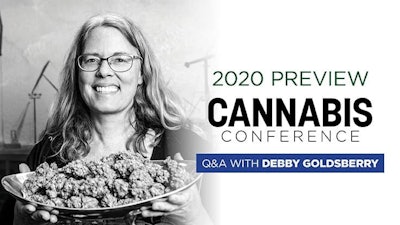
Debby Goldsberry has been a leader and advocate in the cannabis industry for more than 25 years and will speak about the biggest lessons she's learned in those two decades-plus at Cannabis Conference, which will take place April 21-23, 2020. Here, the executive director of Magnolia Wellness shares insights on recent changes that have helped drive profitability, the most important key performance indicator all dispensaries should be tracking and how she's worked through challenges. She also explains how she's worked through specific challenges for women in the industry as part of a series spotlighting leaders in cannabis ahead of International Women's Day, March 8, 2020.
Cannabis Dispensary: When reflecting on the most important lessons you’ve learned over the years, what is one that comes to mind first as being the most significant?
Debby Goldsberry: Using key performance indicators (KPIs) to drive business decisions as opposed to just winging it. And the importance of combining gut and KPI to make the best decision. You can’t just one and you can’t just use the other.
CD: Is there something that happened recently that prompted you to focus on KPIs?
DG: Competition. Competition from more experienced retailers and generally from retailers who come from outside of the cannabis industry. Legacy operators understand the consumer better than anybody. If we combine that knowledge with things like watching payroll to sales and average order value and units per transaction, that’s the winning combination – knowing the consumer and using intelligent data. We have to start competing against very big retailers and making incremental changes that really add up.
CD: What was the first step you took to going toward this more data-driven model?
DG: Really taking a global look at how to use data to drive sales. Me and my senior team did a study on retail KPIs, just looking at everything that everybody is doing across industries in order to see what resonated with us.
CD: Is there one industry that seemed to be the most complementary to cannabis?
DG: We’re Looking at lot at the Sephora model with grab-and-gos and different ways to merchandise the store using a grid format or a circular pattern.
CD: What is the most vital KPI that you wanted to examine right away?
DG: Gross margins. We wanted to get our gross margins above 50%. What the industry is having a real challenge with … is payroll to sales are really out of whack. Most dispensaries are spending way too much on staffing compared to what the retail sales really bear out. Part of it is our unfortunate need to have a high level of scrutiny on inventory management, purchasing and security, so it just gets the whole formula out of whack right there.
Often dispensaries are retail plus – we’re retailers and social service organizations. We’re still giving back to the community in ways most retail stores don’t.
CD: Is there one change that you implemented right away to try to remedy this or apply what you learned from studying other retailers?
DG: We put in grab-and-go stations all around the store – especially at the cash registers. Products that retail at under $15, they are just placed right at the cash register. We find preroll joints are great in the grab-and-go, some of the beauty products like bath soaps are perfect at the grab-and-go. We always feature a strain of cannabis that we put on discount every day, that goes in the grab-and-go also. We’re experimenting with different products, definitely up and down the pricing chain. Having something for $50 at your grab-and-go is not normal, but it works in the cannabis industry.
Grab-and-go does a couple things: it increases our units per transaction and it also increases average order value, which are two of the levers we’re trying to move.
We just changed the way we display our cannabis a couple days ago, and we increased our sales by $2,000 a day. That was a big wake up call to me that literally we could change where a couple display cases were located in our place and how we display products on our shelves and the products would fly. Merchandising is a really big topic on our mind right now.
CD: What would you do differently today when launching a dispensary?
DG: The change from the not-for-profit model to the for-profit model, that’s a huge leap. Magnolia has been around since 2009, so we were a nonprofit for our whole history until 2018. So, changing to the for-profit model and competing with other for profits is totally different.
CD: International Women’s Day is coming up March 8. Does the “glass ceiling” exist in cannabis, and if so, how can it be overcome?
DG: Yes, and I know this well, as I recently hit it myself. Simply put, I needed to spend time learning and developing my skills or could not move forward with my career in the direction I wanted. To combat this, I studied, took on a mentor, did business development and leadership training, and put my new skills into practice. It takes time, but any glass ceiling can be shattered, by learning more and working smarter.
CD: What is one key takeaway you hope attendees will bring back to their business after your two sessions at Cannabis Conference?
DG: Get ready for ups and downs and keep moving through it. There’s no doubt that you’re going to see downs. It’s just a brand new industry. The people who are really surviving are the people who are surviving the downs. That doesn’t mean you have to … have a lot of money, it just means you have to be able to survive and be crafty and be innovative and not let the difficult stuff get you down. Part of my success was to keep moving. You can’t knock me down. I’m going to keep moving, no matter what.
























